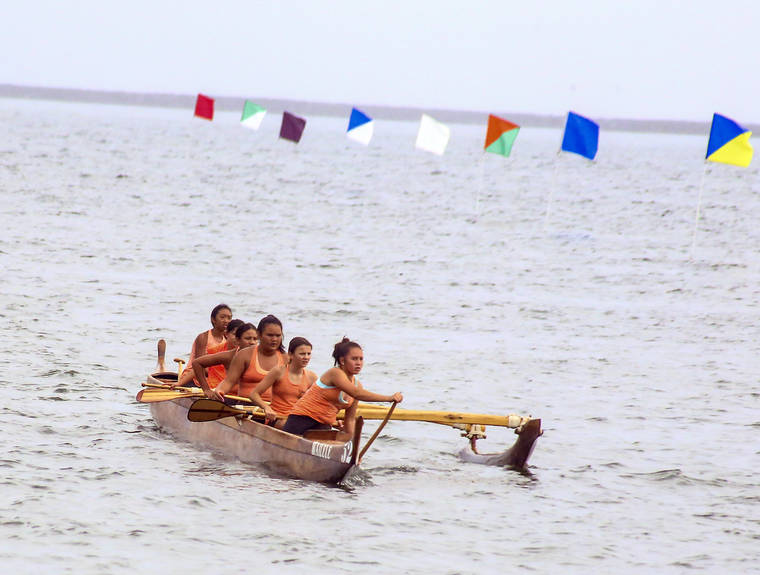As expected Puna charged hard at the first Moku O Hawaii Outrigger Canoe Racing Association regatta at Hilo Bay, its home water, but Kai Opua had already stockpiled enough points to claim the Kailana regatta.
Saturday was overcast, windy and filled with sporadic hit-and-run rain — a rare occurrence in Hilo — but perfect weather conditions for the 15 Moku O Hawaii clubs to renew old rivalries.
Through the first three regattas, Kai Ehitu has been a stubborn thorn for Kai Opua, which lost to its Red Fire Engine neighbor by a single point in the second regatta.
Kai Opua has had a full field for all the regattas. It’s nice to have depth to overwhelm the competition. But Big Blue’s point production came from an unlikely source: rookie and greenhorn paddlers.
Of the eight races the club won, four were by the novice paddlers: women novice B, mixed novice B, mixed novice B, and men novice A. The women novice B took second.
Kai Opua compiled 236 points to capture its third regatta, Puna, which also won eight golds with 38 crews, scored 223 points while Kai Ehitu (37 events) placed third with 189 points.
The other clubs in the A division (24-41 races) followed in familiar order: Keaukaha (34), 158 points; Kawaihae (32), 143; Kamehameha (29), 111; Keoua Honaunau (29), 102; and Waikoloa (25), 95.
Paddlers of Laka (23 races) took Division B (1-23 events) with 105 points and was followed by Keauhou (23), 83; Hui Waa O Waiakea (15), 54; Kailana (14), 38; Milolii (9), 28; Kona Athletic (2), 19; and Na Waa Hanakahi (6), 5.
Through 17 races, Kai Opua had a healthy lead with 117 points. Kai Ehitu was second with 96 and Puna was fifth with 75 points.
Having a strong core of novice B or rookie paddlers is the best way to build a club. They move on to the novice A for another year, then strengthen other crews in the foreseeable future.
But to hold a monopoly on the five novice races, that’s something else. (There is no mixed novice A race.)
Asked the reason for Kai Opua’s novice success, athletic director Mike Atwood offered a two-word answer.
“Coaching and talent,” he said. “Plus there’s a really strong camaraderie. There’s an Ohana-type feeling, and it starts with the coaches. They all work to support one another.”
There’s also depth on the coaching staff, too. Mesepa Tanoai, who’s the Hawaii Prep coach, coaches the mixed novice B and the men novice A crews.
Mel Kelekolio coaches the women novice A, Amy Young and Maile Leslie the women novice B.
When Tanoai isn’t coaching, he’s paddling for the men 50 crew (Scotty Gacayan, Sean Ingram, Morton Larsen, Alex Siqueiros, Kerri Tobin), which won gold in 3:53:06, barely beating Puna’s 3:53.95 in one of the best races of the day.
That was event 39, which was when the day was growing old. A little earlier, Puna had its typical late-race run, winning four straight races: the women junior, men junior, women 40, and men 40.
“It felt good,” said Dallas O’Shaughnessy, who was on the men 40 crew. “We’re finally linking up together. The first few races are not as important as the last few. Those lead up to states. That’s definitely when we want to be peaking.”
Three races later in the women 60, his mom, Susan O’Shaughnessy, took gold along with crewmates Tweetie Anderson-Perreira, Betty Ben, Karen Mickievic, Linda Robb, Nalani Viveiro in 4:40.29 ahead of Kai Opua’s 4:45.21, another down-to-the-wire thriller.
Kai Ehitu beat Puna in the first two regattas in the men 40 races. But Green Pride dominated that event in 3:42.11 to Keaukaha’s 3:43.55 and Kai Ehitu’s 3:43.81.
Last summer, the Puna men 50 (Terry Andrade, Kevin Kaluna, Dave Okita, Troy Parker-Bailey, Kevin Thompson, Afa Tuaolo) was arguably the best crew in Moku O Hawaii. They finished the season unbeaten and won state gold.
Big Blue’s crew, which included Mesepa Tanoai, edged them in a close race.
“Puna reminded everyone why they’re the champs,” said Piki Hayward, a Kai Ehitu coach and paddler on the gold mixed 40 crew. “It’s all about progress.
“We have a simple three-word philosophy that we use: see, recognize, and adjust. It’ll help you in paddling and life.”
For the last four years, Puna’s philosophy has worked the best: keep peaking and beat everyone at the end.



